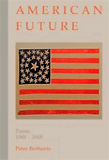August 25, 2009AMERICAN FUTURE
Review by Michael Meyerhofer
Entasis Press
Suite 72
1901 Wyoming Avenue NW
Washington, DC
ISBN 978-0-9800999-4-2
2009, 100 pp., $12.00
www.entasispress.com
I am still reeling from Peter Bethanis’s American Childhood, a wonderfully refreshing book full of big, good poems that span a twenty year period (1988-2008) and range in topic from American consumerism to the life of Li Po, along the way addressing divorce, fatherhood, identity, and loneliness. Right out the gate, Bethanis dazzles us with his title poem:
In 1963 the morning probably seemed harmless enough
for my parents to sign on the dotted line
as the insurance man talked to them for over an hour
around a coffee table about our future.
“This roof wasn’t designed to withstand meteors,”
he told my father…
Here, we see Bethanis’s chief talents as a storyteller: subtle rhythm, imagery, and humor. Sincerity follows in abundance—in this poem and others, like these poignant lines from “Fishing with Grandfather”: “The doctors have given you three, / maybe four months, but nothing stops / your hands from bicycling in bass after bass, / each one flopping like an amp needle to the boat’s side.” These lines might label Bethanis a Deep Imagist, but there are meta-poems here, too, plus excellent turns of phrase like this opening to “The Sophist’s Cellar”: “The sophist stubs his toe / on the meaning of things.” Bethanis is clearly a man who owns many hats, and wears them all quite well.
Bethanis has a knack for blending crisp imagery with sharp commentaries on society and human nature without coming across as heavy-handed. For example in “The Sophist’s Haircut,” Bethanis describes how “…missiles sleep / like drugged rodents in their silos,” then he turns this same flare for description towards the romantic in “Watching a Woman Sleep”: “Her breaths rise and fall and do not try / to be anything other than breaths.”
This book is filled with marvelous examples of taut, enjoyable imagery. Take this passing description of a pool game from “The Pool Shark of Somewhere, Indiana”: “The crack of the break / like wild pigs / covered in mud,” this portrait of military boys “[filling] up the pews like sore moody angels / kicked out of heaven,” (“Military School”) or these funny but relatable lines from “The Sophist’s Dilemma”: “The knot of his hand / grips the chair as he contemplates the walk / up the stairs, as if he were a circus animal / performing the charade of an act, / his real capabilities held behind his eyes.”
I sense a great but humble wisdom in these poems, especially in the self-reflective and highly metaphorical ending of “American Textbooks”: “…I thumbed quietly, / sweaty from recess, my head / in my hands over what, / no matter how much they taught, / took a lifetime to understand.” Perhaps my favorite poem in this book, though, is “The Shoe.” On the surface, this poem describes two sick boys being driven home from school: one, presumably the poet; the other, an African-American boy with a lift in his shoe.
.…We both lay moaning
in the back seat, and then we started
laughing, and then he threw up,
and we laughed harder, and then
he buckled over until he was dropped off,
and I watched him walk with the shoe,
a small raft that kept him afloat
to his doorstep, and never saw him again.
One potential reading of this poem could be that it simply details an innocent, passing kinship between two ill boys who just so happen to never see each other again. But an alternate reading of that last line hints that the African-American boy might have died from his illness—whatever it was—which adds further poignancy to the scene. Or perhaps he, or the narrator, moved away. On the other hand, two people meeting and connecting on some level, then never seeing each other again for even the most harmless of reasons, is itself still a curious and powerful commentary on human nature. Consider, too, the subject of race at the time the events of this poem might have occurred, and you see Bethanis’s talent for saying a lot by saying only a little.
Some of these poems have a gritty, “working class” feel; others remind me of Zen kōans, with the prerequisite humor and brevity. Often, Bethanis manages to weave several tones and styles into something new, something altogether his own. These poems, divided into five sections, offer a wide range of themes and styles; in short, there’s something here for everyone. Narrative threads of mortality, love, loss, and courage weave these poems together quite nicely, though, and this book somehow manages to be a quick read and a haunting one at the same time.